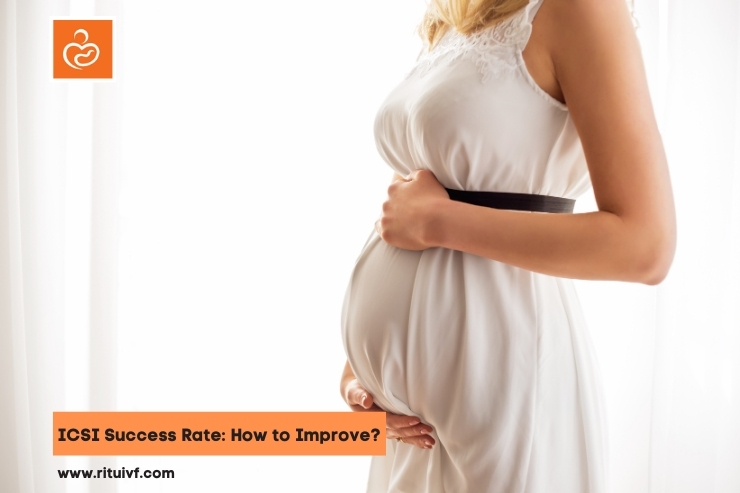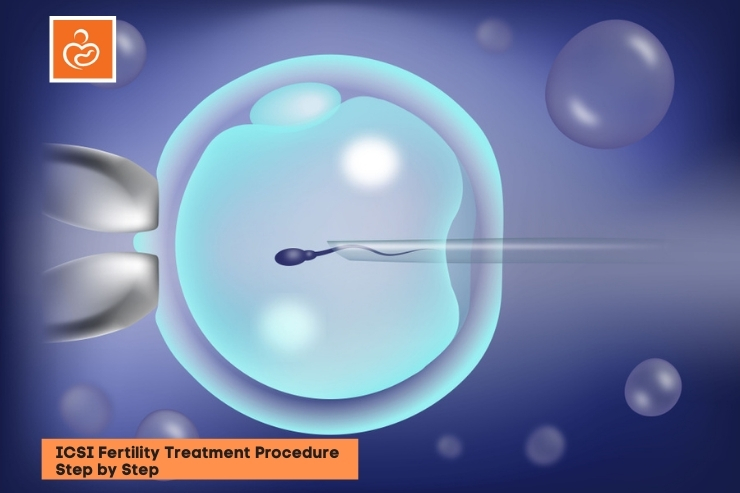Assisted reproductive technology offers hope to infertile couples worldwide. Intracytoplasmic sperm injection (ICSI) is one of the most promising ART treatments, particularly when male infertility prevents conception. While fertility experts frequently discuss this groundbreaking procedure, most couples want to understand the ICSI success rate before proceeding with treatment.
How successful is ICSI treatment, and what factors affect its outcomes? How can you increase your chances of success? This article answers these questions to help you determine if ICSI is the right choice for your fertility journey.
Key Takeaways
- ICSI fertilization rates range from 70-85%, but live birth rates vary significantly by age
- Women under 35: 40-50% live birth rate per cycle
- Women 35-39: 30-35% live birth rate per cycle
- Women 40+: 15-20% live birth rate per cycle
- Egg quality, sperm health, lifestyle, and clinic expertise all impact outcomes
- Most couples require 2-3 cycles to achieve pregnancy
Factors That Influence ICSI Treatment Success Rates

Understanding the success rate of any ICSI treatment is crucial for couples and individuals navigating the effectiveness of advanced fertility treatments. Despite the tailored approach that intracytoplasmic sperm injection offers to fertility challenges, The procedure’s efficacy depends on several factors like maternal age, sperm quality, etc. Let us discuss these factors individually to help you gain valuable insights.
1. Sperm quality
The quality of the sperm is one of the main factors determining the outcome of the ICSI procedure. Sperm quality can encompass various parameters like DNA integrity, motility, and morphology. These are all critical determinants of the success of fertilization. Thus, using high-quality sperm after the meticulous evaluation is mandatory to optimize ICSI fertility success rates.
2. Egg quality
In the ICSI process, egg quality is of equal significance. The egg quality is superior in younger women. Naturally, the ICSI fertilization success rates are higher in women in their late 20s and early 30s. Age is not the only thing that affects egg quality. Poor egg quality can also be linked to fertility issues, diet, and overall health. The good news is that medical interventions can enhance egg quality.
3. Maternal age
A pivotal factor that can directly impact the ICSI success rate by age is maternal age. Research has revealed that as women age, the success rates for ICSI and other ARTs keeps decreasing. As mentioned already, people under 30 have a higher success rate than 35+ women. Knowing these age-related limitations is essential.
4. Fertility issues
Besides sperm quality, egg quality, and age, underlying fertility complications profoundly influence the ICSI success rate. Some such issues are polycystic ovarian syndrome, endometriosis, severe male infertility, and unexplained infertility. In such cases, doctors first address the underlying issues and then begin in vitro fertilization or ICSI treatment.
5. Uterine environment
Did you know that the uterine lining’s receptivity can stand in the way of embryo implantation? From hormone levels to endometrial thickness – everything should be favorable to facilitate implantation.
6. Ovarian reserve
The ovarian reserve comprises the quality as well as quantity of a person’s eggs and this too will play a big role in your ICSI success rate. If the ovarian reserve of a woman is gradually diminishing, it is bound to lower the success rate. There are multiple tests to assess the ovarian reserve before the commencement of the ICSI procedure. Then treatment strategies can be tailored accordingly for ovarian stimulation.
7. Lifestyle factors
Smoking, diet, body weight, and alcohol consumption can be the reason behind ICSI failure. So, the moment you plan your pregnancy, you should adopt a healthy lifestyle to naturally improve outcomes. This will also ensure that you have a blissful pregnancy and a smooth delivery.
8. Fertility Clinic
You should take your time to shortlist the top fertility clinics in your neighborhood. A well-known fertility center will have experienced doctors and advanced technologies. These vastly contribute to a high success rate.
Understanding ICSI Success Rates
What Do ICSI Success Rates Really Mean?
When discussing ICSI success rates, it’s essential to understand three different metrics:
1. Fertilization Rate (70-85%): The percentage of eggs successfully fertilized after sperm injection. ICSI typically achieves fertilization in 70-85% of mature eggs.
2. Pregnancy Rate (35-45% per cycle): The percentage of cycles resulting in a confirmed pregnancy. This varies significantly based on age and other factors.
3. Live Birth Rate (30-40% per cycle overall): The most important metric—the percentage of cycles resulting in a healthy baby. This is what matters most to couples.
Important: These rates are per cycle. Many couples require multiple cycles to achieve a successful pregnancy.
Revised ICSI Success Rate Section
ICSI Success Rates by Age
Success rates vary dramatically based on maternal age:
Under 30 years
- Fertilization rate: 80-85%
- Pregnancy rate per cycle: 45-50%
- Live birth rate per cycle: 40-50%
30-34 years
- Fertilization rate: 75-80%
- Pregnancy rate per cycle: 40-45%
- Live birth rate per cycle: 35-40%
35-39 years
- Fertilization rate: 70-75%
- Pregnancy rate per cycle: 30-35%
- Live birth rate per cycle: 25-30%
40-42 years
- Fertilization rate: 65-70%
- Pregnancy rate per cycle: 20-25%
- Live birth rate per cycle: 15-20%
43+ years
- Fertilization rate: 60-65%
- Pregnancy rate per cycle: 10-15%
- Live birth rate per cycle: 5-10%
Note: These are average rates. Individual results depend on specific fertility factors and clinic expertise.
Optimizing Your ICSI Outcomes: Evidence-Based Strategies
1. Nutritional Support (3-6 months before treatment)
- For egg quality: Eat antioxidant-rich foods like berries, leafy greens, nuts, and fatty fish (salmon, sardines)
- For sperm quality: Include zinc-rich foods (oysters, pumpkin seeds), vitamin C, and folate
- Key nutrients: Folate, vitamin D, omega-3 fatty acids, CoQ10
- Foods to emphasize: Eggs, whole grains, legumes, avocados, colorful vegetables, and fruits
2. Achieve Optimal Body Weight
- Maintain BMI between 18.5-24.9 for best outcomes
- Both underweight and overweight status can reduce success rates by 20-30%
- Exercise moderately: 30 minutes daily of walking, yoga, or swimming
- Avoid excessive high-intensity workouts during treatment
3. Eliminate Harmful Substances
- Quit smoking: Smoking reduces ICSI success by up to 50%
- Limit alcohol: Even moderate consumption can decrease success rates
- Reduce caffeine: Keep intake below 200mg daily (1-2 cups of coffee)
- Avoid recreational drugs: These significantly impair egg and sperm quality
4. Stress Management
- Practice relaxation techniques: meditation, deep breathing, or acupuncture
- Consider counseling or support groups for emotional support
- Get 7-8 hours of quality sleep nightly
- Maintain work-life balance during treatment
5. Medical Optimization
- Supplement wisely: Take prenatal vitamins with folic acid (400-800 mcg), vitamin D (1000-2000 IU), and CoQ10 (200-600 mg) after consulting your doctor
- Treat underlying conditions: Address thyroid issues, PCOS, endometriosis before starting ICSI
- Timing matters: Follow your clinic’s protocol precisely for medications and procedures
6. Choose the Right Clinic
- Research clinics with ICSI success rates above national averages
- Look for experienced embryologists (critical for ICSI technique)
- Verify the lab uses advanced technologies (time-lapse imaging, laser-assisted hatching)
- Read patient reviews and ask about individualized treatment protocols
7. Partner Preparation
- For men: Avoid hot tubs, saunas, and tight underwear for 3 months before treatment
- Reduce oxidative stress: Both partners should minimize exposure to toxins, chemicals, and heavy metals
- Time intercourse strategically: Follow your clinic’s guidance on abstinence periods
Conclusion
In the end, remember that a comprehensive understanding is essential for you and your partner before you embark on your icsi fertility treatment procedure. This way, you will not just be making informed decisions but also be participating actively in the entire process. A personalized approach and the guidance of an accomplished fertility specialist will maximize the chances of success and help you achieve parenthood safely and with confidence.
Frequently Asked Questions (FAQ)
1. What is the difference between IVF and ICSI?
In conventional IVF, sperm and eggs are mixed together in a dish, allowing fertilization to occur naturally. ICSI involves directly injecting a single sperm into each egg using a microscopic needle. ICSI is specifically designed for severe male infertility or when previous IVF attempts resulted in poor fertilization. While IVF requires thousands of sperm, ICSI needs only one sperm per egg.
2. What is the ICSI success rate for the first attempt?
First-time ICSI success rates vary by age: 40-50% live birth rate for women under 35, 30-35% for ages 35-39, and 15-20% for women over 40. These figures represent live birth rates per cycle, not just pregnancy rates. Most couples achieve pregnancy within 2-3 cycles. Remember that fertilization rates (70-85%) are higher than live birth rates because not all fertilized embryos successfully implant and develop.
3. How much does ICSI cost in India?
ICSI costs typically range from ₹1,80,000 to ₹3,50,000 per cycle, depending on the clinic, location, and required medications. This includes ovarian stimulation, egg retrieval, ICSI procedure, embryo transfer, and initial monitoring. Medications add an additional ₹40,000-₹80,000. Frozen embryo transfers cost ₹30,000-₹60,000. Tier-1 cities generally have higher costs than tier-2 and tier-3 cities.
4. How long does the entire ICSI process take?
From starting medications to embryo transfer: approximately 4-6 weeks. Including pre-treatment testing, preparation, and lifestyle modifications: 2-3 months total. The pregnancy test occurs 14 days after embryo transfer. Here’s the breakdown:
- Pre-treatment preparation: 1-3 months
- Ovarian stimulation: 8-14 days
- Egg retrieval to transfer: 3-5 days
- Two-week wait: 14 days
5. Can ICSI cause birth defects or complications?
Large international studies show ICSI children have similar birth defect rates (2-3%) as naturally conceived children. There’s a slightly increased risk of minor sex chromosome abnormalities, which is why genetic counseling is recommended for some cases. The procedure itself is safe when performed by experienced embryologists, with egg damage occurring in only 1-2% of cases. Thousands of healthy babies are born through ICSI every year worldwide.
6. How can I increase my chances of ICSI success?
To improve ICSI outcomes:
- Nutrition: Take CoQ10 (300-600mg daily), prenatal vitamins, vitamin D, and eat antioxidant-rich foods
- Lifestyle: Maintain healthy BMI (18.5-24.9), exercise moderately, get 7-8 hours sleep
- Avoid: Smoking (reduces success by 50%), alcohol, excessive caffeine (>200mg/day)
- Timing: Start improvements 3 months before treatment
- Clinic selection: Choose experienced fertility centers with high success rates
- Stress management: Practice relaxation techniques, consider counseling
Start these changes at least 3 months before your ICSI cycle for maximum benefit.

